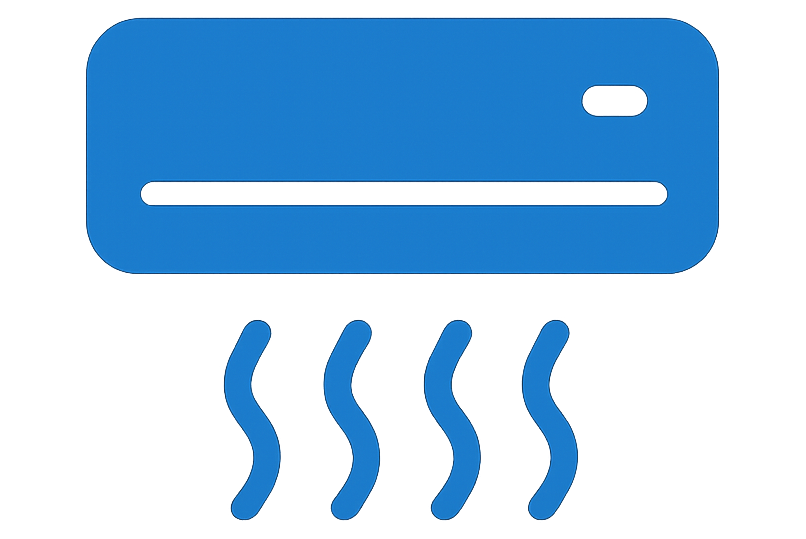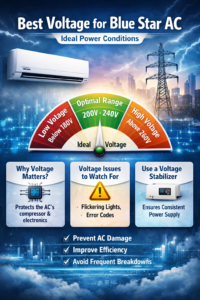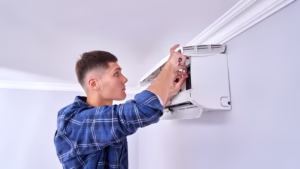When the scorching heat of summer hits, your air conditioning (AC) unit becomes your best friend. But what happens when that trusty machine starts acting up? Don’t sweat it! Let’s dive into common AC problems and how to fix them, so you can stay cool all season long.
Learning How an AC System Works
An air conditioner isn’t simply a box that blows out cold air — it’s a precisely coordinated device. Learning the main components will aid you in catching issues early on:
- Compressor – Also referred to as the AC’s heart, the compressor drives refrigerant throughout the system and compresses it. If the compressor fails, the AC will not cool at all.
- Condenser Coil – This can be found in the outdoor unit, where it dissipates heat from the refrigerant out. Soiled coils waste energy and can lead to overheating of the system.
- Evaporator Coil – In your home, this coil removes heat from the indoor air. When the coil freezes or becomes clogged, cooling is severely affected.
- Expansion Valve – Disclosed the flow of refrigerant to the evaporator, thus effective cooling. A faulty valve will create uneven temperatures.
- Thermostat – Controls the indoor temperature and turns the AC on and off. Thermostat problems in some cases can masquerade as system failure.
Pro Tip: Having an idea of how these parts work means you can decide if the issue is mechanical, electrical, or just an airflow problem.
1. AC Won’t Turn On
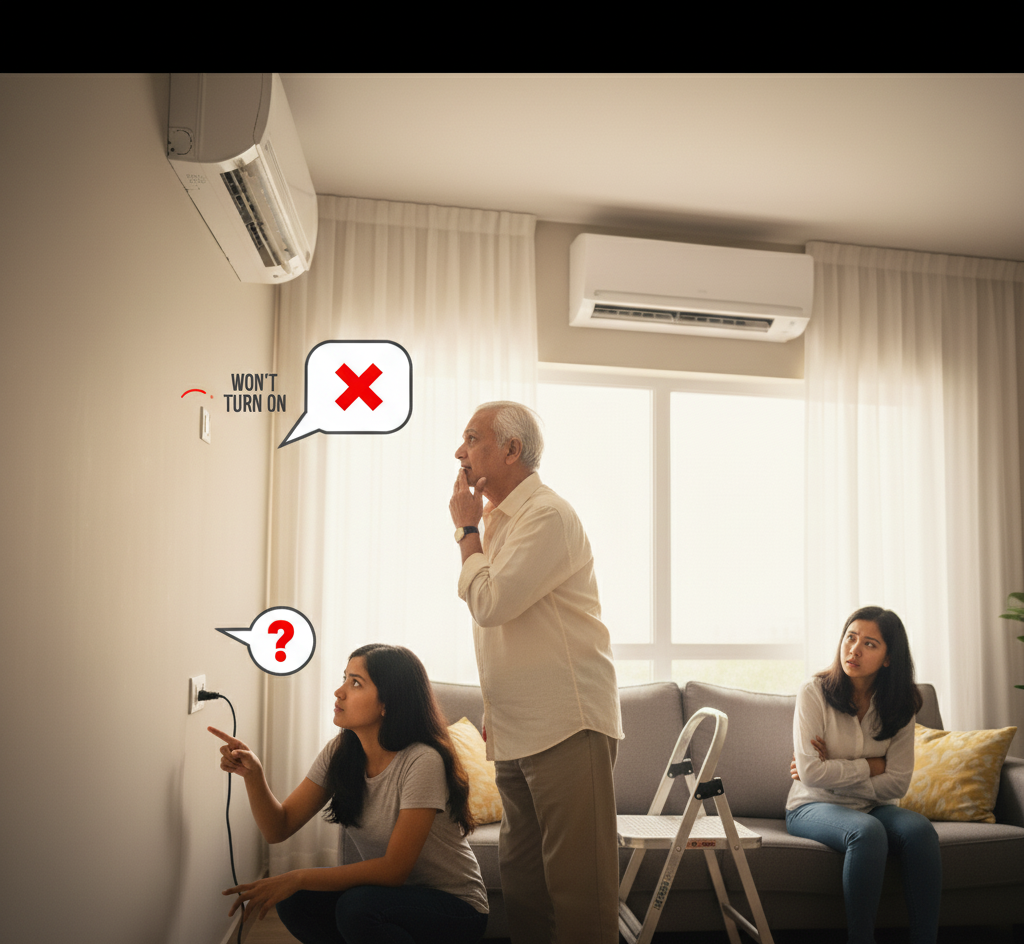
It’s a hot day, and you eagerly crank up the AC, only to be met with… nothing. One of the most frustrating common AC problems and how to fix them involves an AC unit that refuses to turn on. Here’s what you can do:
Check the Thermostat Settings
Before jumping to conclusions, make sure your thermostat is set to “cool” mode and the temperature is lower than the current room temperature. It’s one of the easiest common AC problems and how to fix them. check out our article to avoid common ac problems Best Blue Star AC Maintenance Tips in 2025
Inspect Circuit Breakers
Another issue that can prevent your AC from turning on is a tripped circuit breaker. Head to your circuit breaker panel and check if the breaker connected to your AC has flipped to “off.” Reset it to see if this solves the issue.
Examine the AC Unit’s Power Supply
Finally, make sure your AC is properly plugged in (if applicable) and that no damage is visible on the power cord. If there’s no visible damage and it’s still not working, it might be time to call a professional. This is a more complicated issue in the world of common AC problems and how to fix them.
DIY AC Troubleshooting Checklist
Rather than having a technician come to fix it, you can likely fix some common issues on your own. The below quick fixes cover the most common AC complaints:
- Thermostat Check – Make sure it is set to “cool” and the temperature below the room. Replace batteries if they are low.
- Air Filters – Dirty filters decrease airflow, causing poor cooling. Replace every 2–3 months or clean washable ones.
- Outdoor Unit Clearance – Leaves, dust, or debris surrounding the unit may restrict airflow. Allow at least 2 feet of clearance.
- Circuit Breaker – Tripped circuit breakers or blown fuses. A reset may work sometimes.
- Vents & Ducts – Open all vents and keep them unobstructed to facilitate optimum airflow.
Impact: Utilize this checklist to correct over 50% of minor AC problems, saving time and service funds.
Common Blue Star AC Error Codes and Their Meanings
Blue Star ACs use error codes to help you identify specific issues. Here are some frequent codes and what they indicate:
| Error Code | Meaning | Suggested Action |
|---|
| E1 | Sensor failure | Check sensor wiring; replace if damaged |
| F3 | Communication error | Reset AC; inspect PCB connections |
| E2 | Indoor fan malfunction | Clean fan; call technician if persistent |
| H1 | High-pressure trip | Ensure condenser is clean and unobstructed |
2. AC Blows Warm Air
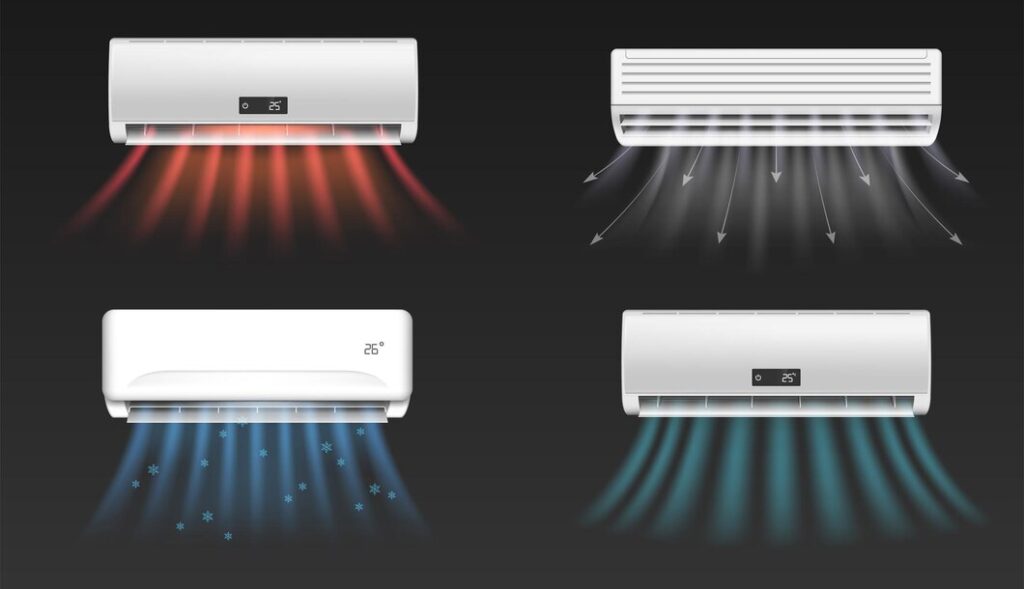
Another common issue with AC units is when they blow warm air instead of cool. It’s frustrating, especially when you need relief from the heat. Here are some steps to fix this common AC problems and how to fix them
Verify Thermostat Settings
Ensure the thermostat is set to “cool” mode and the temperature is lower than the room temperature. It’s a simple fix for this common AC problem and how to fix it.
Assess Refrigerant Levels
Low refrigerant is a common reason why your AC blows warm air. This is a problem you can’t fix on your own, as refrigerant requires professional handling. Contact a technician to have the refrigerant levels checked and refilled.
Clean or Replace Air Filters
A clogged or dirty air filter can restrict airflow, causing your AC to struggle in cooling your home. Cleaning or replacing the filter can resolve this common AC problems and how to fix it.
3. AC Short Cycling
When your AC unit turns on and off rapidly, it’s called “short cycling.” This can result in inefficiency and unnecessary wear on your AC. Let’s tackle this common AC problems and how to fix them.
Identify Causes of Short Cycling
Dirty air filters, low refrigerant levels, or an oversized AC unit can cause short cycling. Start by replacing or cleaning the air filter, and if the issue persists, it may require professional attention.
Solutions to Prevent Short Cycling
Regular maintenance is essential to prevent common AC problems and how to fix them, including short cycling. Scheduling an annual tune-up can help your AC run smoothly.
4. Weak Airflow from Vents
One of the more annoying common AC problems and how to fix them involves weak airflow. It might make the whole house feel stuffy.
Inspect Air Filters
Dirty filters can block airflow. Check the air filter, clean or replace it if necessary, and you’ll often find that weak airflow becomes a thing of the past.
Check for Blockages in Ductwork
Sometimes, there are physical blockages within your ductwork. Inspect your ducts for obstructions like dirt or debris that might be restricting airflow.
Assess the Blower Fan Function
The blower fan is responsible for pushing air through your ducts. If it’s malfunctioning, weak airflow could be a result. Check the fan’s operation and call a professional if you suspect a problem.
5. AC Produces Strange Noises
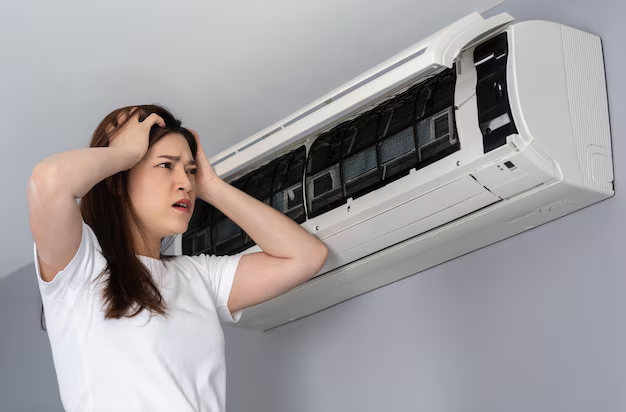
Unusual sounds from your AC unit can be unsettling. It’s a sign that something isn’t quite right. Let’s look at common AC problems and how to fix them when it comes to strange noises.
Recognize Different AC Noises
First, identify the type of sound your AC is making. Is it a grinding noise, a rattling sound, or something else? Each type of sound can point to different issues.
Troubleshoot Common Noises
Rattling could indicate loose components, while grinding sounds might signal an issue with the motor or fan. Depending on the type of noise, a quick fix might be as simple as tightening screws or as complicated as replacing the motor.
6. Water Leakage Around AC Unit
Water leaking from your AC is another frustrating issue that can lead to water damage in your home. Here’s how to deal with this common AC problems and how to fix them:
Investigate Drainage Issues
Clogged or misaligned drainage pipes are often the cause of water leakage. Check the pipes connected to your AC unit and clean them out to ensure proper drainage.
Address Refrigerant Leaks
In some cases, refrigerant leaks can lead to excess moisture around your AC. If you suspect a refrigerant leak, call in a professional to assess and repair the issue. For a step-by-step solution to leakage problems, check out this complete guide on Blue Star AC Water Leakage Problem – Full Fix Guide (2026).
7. Frozen Evaporator Coils
Frozen evaporator coils are one of those common AC problems and how to fix them that require immediate attention. If your AC isn’t cooling properly, frozen coils might be the cause.
Causes of Frozen Coils
Frozen coils are typically caused by restricted airflow, low refrigerant, or dirty filters. Identifying the root cause is key to fixing the issue.
Steps to Resolve Frozen Coils
Turn off the AC to allow the coils to thaw. Once thawed, inspect and clean the air filters, check the refrigerant levels, and ensure the airflow is unimpeded.
8. AC Doesn’t Respond to Thermostat
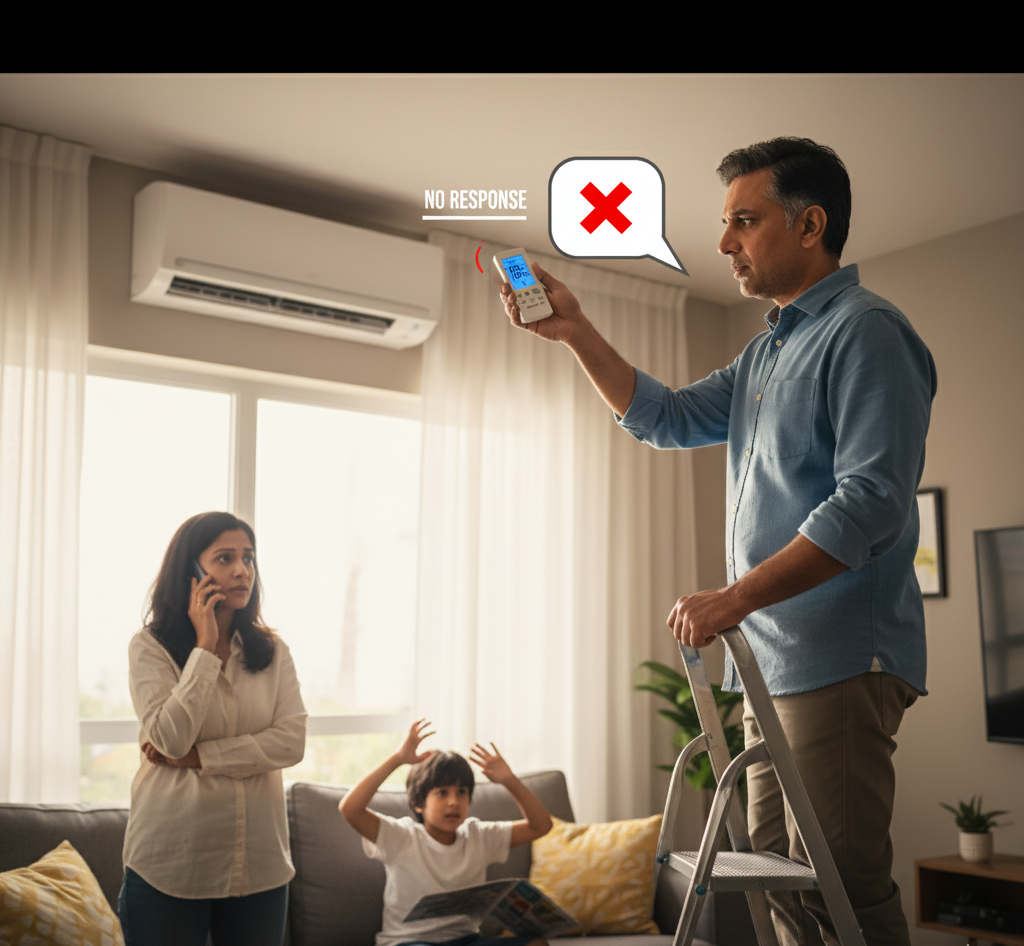
Sometimes, your AC just doesn’t respond when you adjust the thermostat. This is another common AC problems and how to fix them.
Examine Thermostat Functionality
Ensure that your thermostat is in good working order. Check the batteries (if applicable) and ensure it’s connected to your AC unit.
Inspect Wiring Connections
Faulty wiring can prevent the thermostat from sending signals to your AC. If you suspect an issue with the wiring, a professional should inspect it for safety and proper functioning.
Consider Thermostat Calibration
In some cases, your thermostat might need calibration. A technician can calibrate the thermostat to ensure it communicates effectively with your AC unit.
9. High Energy Bills Due to AC
Your AC might be running efficiently, but if it’s consuming too much energy, you’ll notice a spike in your electricity bills. Here’s how to address this common AC problems and how to fix them:
Identify Energy-Consuming Factors
An inefficient AC unit can be the culprit. Check if your AC is too old or if it’s oversized for your home. Sometimes, a few adjustments can significantly lower energy consumption.
Tips to Improve AC Efficiency
Changing filters regularly, sealing leaks around windows and doors, and ensuring your AC is serviced annually can help improve its efficiency.
10. AC Smells Bad
A bad-smelling AC unit can make your home feel uncomfortable and uninviting. Here are a few steps to resolve this common AC problems and how to fix them:
Determine Causes of Unpleasant Odours
Musty odours typically come from mild or mildew build-up in the ductwork. A burnt smell might indicate an electrical issue.
Methods to Eliminate AC Odours
Cleaning your ductwork, replacing the air filter, and disinfecting the AC unit can often eliminate unpleasant smells and restore freshness to your home. For a complete breakdown of bad odours and quick fixes, check out this article on Blue Star AC Smell Problem – Causes & Quick Fix 2026.
11. AC Runs Constantly
An AC unit that runs non-stop is a sign of an underlying problem. Here’s how you can fix this common AC problems and how to fix them:
Assess Thermostat Settings
Ensure that the thermostat is properly set to the desired temperature. If it’s set too low, your AC might run continuously.
Check for Refrigerant Leaks
Low refrigerant levels can cause your AC to overwork, leading to continuous running. Have a technician check and replenish the refrigerant.
Evaluate System Size and Capacity
An improperly sized AC unit might not cool your space effectively, causing it to run longer than necessary.
12. Inconsistent Cooling in Different Rooms

One of the common AC problems and how to fix them is when some rooms feel cool, and others are too warm. Here’s how to fix it:
Investigate Ductwork Issues
Airflow imbalances often result from ductwork issues. Ensure that all vents are open and unobstructed.
Balance Airflow Across Vents
Use dampers to adjust the airflow and ensure even cooling throughout your home.
Consider Zoning Systems
Zoning systems allow you to control the temperature in different areas of your home, ensuring consistent cooling in all rooms.
13. AC Unit Emits Dust
Dust and dirt from your AC can compromise indoor air quality. Here’s how to resolve this common AC problems and how to fix them:
Inspect Air Filters
Clogged filters can lead to dust build-up. Replace or clean your filters to prevent dust from being blown into your home.
Clean Ductwork and Vents
Dust in your ducts can spread throughout your home. Have your ducts professionally cleaned to improve air quality.
Utilize Air Purifiers
Using air purifiers in conjunction with your AC can help filter out dust and allergens, making your home more comfortable.
14. AC Unit Turns On and Off Frequently
Frequent on-and-off cycling can waste energy and strain your system. Here’s how to address this common AC problems and how to fix them:
Identify Causes of Frequent Cycling
Dirty air filters, low refrigerant levels, and thermostat problems can all contribute to frequent cycling.
Solutions to Stabilize Operation
Cleaning or replacing filters, checking refrigerant levels, and ensuring your thermostat is properly set can help stop frequent cycling.
15. When to Call a Professional Technician
Sometimes, common AC problems and how to fix them require professional help. Here’s when to call in an expert:
Signs That Require Expert Attention
If your AC is experiencing refrigerant leaks, electrical issues, or complex mechanical problems, it’s best to contact a professional.
Benefits of Professional Maintenance
A technician can perform routine maintenance, identify hidden issues, and ensure your AC is running at its best.
Cost of Common AC Repairs in India (2025)
Understanding repair costs helps you decide whether fixing or replacing your AC is worthwhile.
| Problem | Average Cost (₹) | Who Should Fix |
|---|---|---|
| Gas recharge | 1,500–3,000 | Technician |
| Fan motor replacement | 2,000–4,000 | Technician |
| PCB replacement | 3,000–6,000 | Technician |
| Filter cleaning | 0–500 | DIY |
| Thermostat issue | 800–1,500 | Technician |
Tip: Preventive maintenance, such as cleaning filters and coils, can significantly reduce repair costs.
When to Repair vs Replace
Knowing when to repair or replace your AC saves money:
- Repair: Minor issues like fan motor replacement or gas recharge on units <10 years old.
- Replace: ACs older than 10 years, frequently breaking down, or with outdated efficiency ratings. Investing in a 5-star inverter AC can save long-term electricity costs.
Best Blue Star AC Models for Small Rooms here for readers looking to upgrade.
Conclusion
When it comes to common AC problems and how to fix them, many issues can be resolved with a little know-how and regular maintenance. However, some problems may require professional attention. By staying proactive with your AC’s upkeep, you can enjoy a cool, comfortable home without unnecessary interruptions.
FAQs
1. How often should I replace my AC air filter?
It’s recommended to replace your AC filter every 1-3 months, depending on usage.
2. What’s the average lifespan of an AC unit?
Typically, an AC unit lasts between 10-15 years, depending on maintenance and usage.
3. Why does my AC smell musty?
A musty smell usually indicates mild or mildew build-up in the ducts or AC unit.
4. Can I fix a refrigerant leak myself?
No, handling refrigerant requires professional expertise due to safety regulations.
5. How do I know if my AC is oversized for my home?
If your AC unit is frequently short cycling or struggles to maintain a consistent temperature, it might be oversized.
